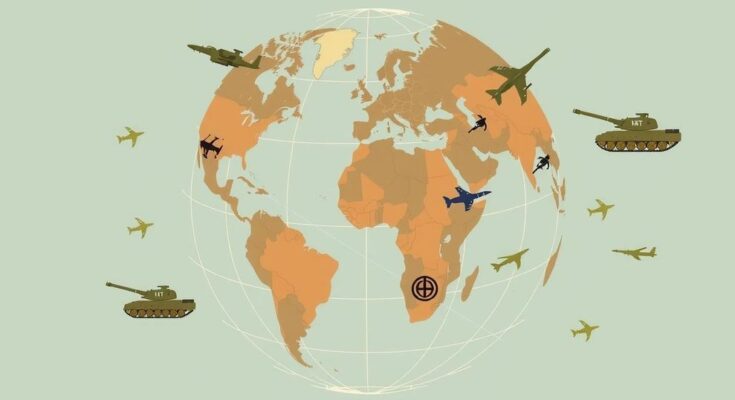Colombian mercenaries have been engaged in Sudan’s conflict, particularly aiding the Rapid Support Forces (RSF). The involvement followed their recruitment by a UAE company, with a drone strike by Sudanese Armed Forces killing some prior to reaching conflict zones. The situation indicates a troubling trend of international mercenary utilization and economic exploitation of ex-soldiers.
A single road traversing the Libyan desert connects the coastal city of Benghazi to al-Uwaynat on the Sudanese border. This route facilitated the movement of numerous Colombian mercenaries who joined the Rapid Support Forces (RSF) in late 2024. Tragically, a Sudanese Armed Forces (SAF) drone strike in November resulted in the deaths of 22 Colombian fighters before they reached el-Fasher, the capital of North Darfur, the only remaining state in western Sudan not controlled by the RSF.
The mercenaries are believed to have been among 300 initially recruited by the Emirati company Global Security Service Group to work as security personnel in the United Arab Emirates (UAE). Subsequently, at least 40 of these operatives were dispatched to Benghazi and then to western Sudan, as part of the UAE’s support for the RSF in the ongoing conflict against the SAF. In response to the incident, the Colombian government issued two apologies to Sudanese officials regarding the involvement of their nationals in the conflict.
This situation is not unprecedented; the UAE had previously engaged Colombian mercenaries in combat, particularly during its 2015 recruitment of 450 Latin Americans to fight against Houthi rebels in Yemen. The emergence of Colombian mercenaries in Sudan was revealed through videos shared by SAF soldiers on social media after they attacked the convoy, showing identification documents belonging to mercenary Lombana Moncayo.
British investigative site Bellingcat utilized Moncayo’s social media activity to ascertain his location in southeast Libya. Researcher Carlos Gonzales detailed that the footage was recorded from a vehicle headed towards Al-Jawf, nearly 300-400 kilometers from Sudan’s border.
Jeremy McDermott, co-founder of InSight Crime, noted that the UAE capitalizes on the lack of lucrative employment options for former Colombian soldiers. He emphasized the advantage of their extensive combat experience, stating, “It’s not just the training, but it’s the combat experience. Colombians are far and away ahead of most militaries in the world.”
Colombian mercenaries are also comparatively less expensive than similarly skilled ex-soldiers from other nations. La Silla Vacía identifies retired Colombian Army Colonel Alvaro Quijano as the orchestrator behind the mercenaries’ deployment to Sudan. The mercenaries were affiliated with International Services Agency A4SI, a company owned by Quijano’s wife, Claudia Viviana Oliveros.
Reports indicate that A4SI has deceived many former Colombian military personnel with promises of employment in the UAE. Omar Antonio Rodríguez, a retired Colombian Army Major and co-founder of A4SI, revealed the company’s ongoing recruitment efforts, stating, “If they manage to bring the 1,500 men they plan to send to Sudan, that could represent 32 billion pesos [$7.7 million] in one year.”
In conclusion, the involvement of Colombian mercenaries in the Sudan conflict underscores the alarming international dynamics of modern warfare. Driven by economic desperation and facilitated by foreign entities such as the UAE, these mercenaries represent a growing trend of private military actors. The ramifications of such involvement not only affect the countries in conflict, but also reflect the challenges enduring within the broader security and employment sectors for former military personnel in Colombia.
Original Source: www.defenceweb.co.za




